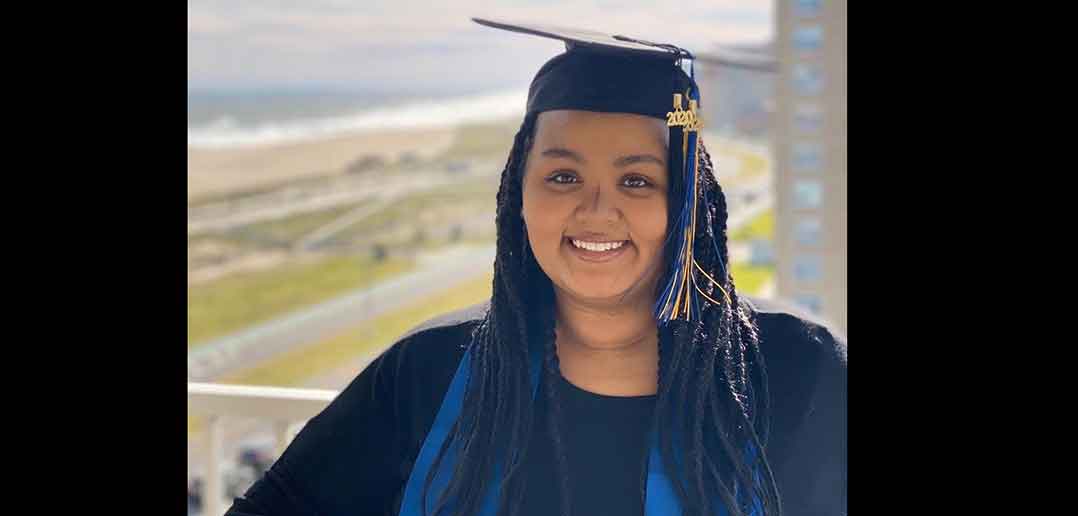Zuher Ibrahim, a second-year graduate student in the Master of Science in Humanitarian Studies program, died in her sleep on Sunday, April 24.
Originally from Shire, Ethiopia, Ibrahim grew up in Queens, New York. Throughout her childhood, she returned to Ethiopia to visit relatives. According to her family, it was the disparities between her life in New York and those in her homeland that lit within her a passion for social justice and humanitarianism.
Ibrahim earned a Bachelor of Arts in Political Science and History from Pace University, with a double minor in Peace and Justice Studies and Critical Race and Ethnicity Studies. In 2020, she enrolled in the MS in Humanitarian Studies program at Fordham’s Graduate School of Arts and Sciences. She was preparing to graduate in August and was applying for doctoral programs with the hope of working for an international NGO and eventually launching an education-focused nonprofit in Ethiopia. The University recently announced that it will grant Zuher’s degree posthumously.
According to her friends and advisers, Ibrahim was a brilliant and charismatic student who juggled a full academic workload and a full-time job as a risk analyst at the law firm Cleary Gottlieb Steen and Hamilton LLP, where she had been employed since 2018. She also devoted time to fighting against injustices and encouraging others to become engaged in policy reform in a podcast she co-hosted called “Just Too Opinionated.”
“Zuher was a tireless and respected advocate for peace,” said Joseph M. McShane, S.J., president of Fordham University.
“For the last two years, she had dedicated herself to advocacy work around Ethiopia’s Tigray region, where the nation’s civil war has brought widespread suffering and left thousands dead. We can all be proud that a member of our University community was striving to help others in a place where courageous humanitarian effort is so very necessary.”
Ibrahim, who had been living in Queens, New York, was a fierce advocate for many other causes that were important to her. According to her LinkedIn profile, she advocated for students of color at the Vera Institute of Justice, campaigned for social change as a program organizer at DoSomething.org, and strived to increase awareness of assault and rape as a communications associate at #PaceUEndRape, among other advocacy roles.
“What struck me the most about her is just how committed she was to political activism and to fighting injustice,” said Ibrahim’s adviser and instructor, Laura Perez, the Helen Hamlyn Senior Fellow, and director of graduate studies at Fordham’s Institute of Humanitarian Affairs (IIHA).
“She was absolutely 24/7 involved in the advocacy work around Tigray in Ethiopia, and she brought that kind of activism to everything she did. For her, the fight against injustice was at the forefront of her mind and really informed everything that she did. That was the purpose of her life.”
In a 2020 interview on the IIHA website, Ibrahim reflected on what inspired her, and cited the words of Martin Luther King Jr.: “Life’s most persistent and urgent question is, ‘What are you doing for others?’”
“The grave differences of inequities present in the world made me question why [I should] have more access to education, clean water, and economic mobility solely because of where I live,” Zuher said.
“What gets me out of bed each morning is knowing that I have the chance to make the world a better place.”
Nana Osei-Opare, Ph.D., an assistant professor of history who was Ibrahim’s thesis adviser, commended her “extreme commitment” to the causes she believed in.
“She was a young woman with a whole life ahead of her,” he said.
“It’s such a sad shame that someone with her passion is no longer with us.”
Ibrahim is survived by her brother, Fahme Ibrahim; her mother, Aziza; her father, Ali; and her grandparents, aunts, uncles, and friends. In conformity with Muslim tradition, she was laid to rest on Wednesday, April 27. A fundraiser has been organized for her funeral and other related expenses.
—Claire Curry


